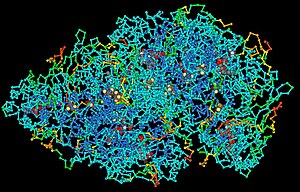Macromolecule
For the scientific journal, see Macromolecules (journal).
A macromolecule is a very large molecule commonly created by polymerization of smaller subunits (monomers). They are typically composed of thousands or more atoms. The most common macromolecules inbiochemistry are biopolymers (nucleic acids, proteins, carbohydrates and polyphenols) and large non-polymeric molecules (such as lipids and macrocycles).[1] Synthetic macromolecules include common plastics and synthetic fibres as well as experimental .
Definition:
A macromolecule is a molecule with a very large number of atoms. Macromolecules typically have more than 100 component atoms.
Examples
: Most polymers are macromolecules and many biochemical molecules are macromolecules.aterials such as carbon nanotubes







0 comments:
Post a Comment